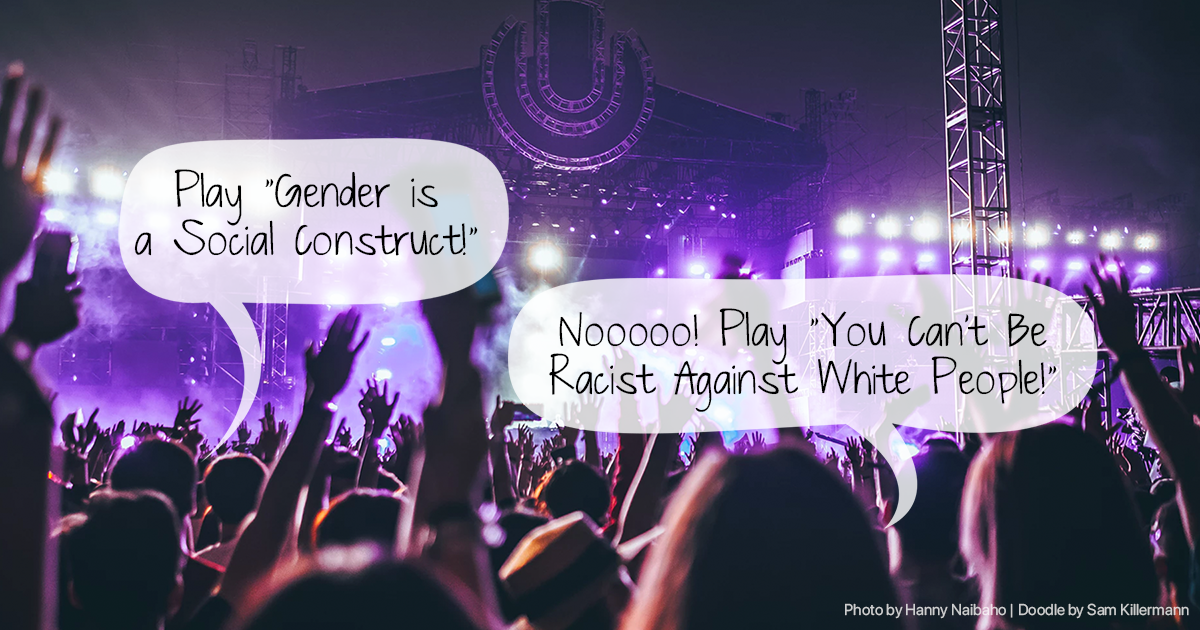Maybe it was Glee. I don’t know. But at some point, within a small subsection of a small subsection of the population, social justice became cool. And whenever something becomes cool, two things tend to follow.
The first is that some of the people who like the cool thing start to covet it, protect it from outsiders, and claim it as their own — when just moments before those same people were making desperate pleas to others to like the thing they liked. It goes from “Like my thing! My thing is great! Please!” to “Uh… this is my/our thing, and you’re not cool enough to like it.” As a resident of Austin, TX, the original weird city and general hipster Mecca, I see this phenomenon play out with a new thing daily.
Next, some of the people who dislike the cool thing form their own “anti-cool” community, which also happens to serve as a retention basin for people who were rejected by the first group. So we have people who always disliked (or hated) the thing, plus everyone who felt disliked (or hated) by the people who liked the thing, and they’re all swirling together, singing Offspring.
You’ve seen it happen a million times. But with social justice, this is where things start to deviate from the norm.
Unlike a band, or film, or clothing style, or particularly violent jewelry, social justice is about a core set of beliefs, and how we want to reshape society to reflect them.
It’s that combination that I’m calling attention to here, because it’s important: ideas + change.
Most trends, or fandoms, tend to be solely focused on the thing — the band, the film, the style, etc. No overwhelming introspection. No investigation of other likes, actions, habits. No ask for broader societal change. You can like a thing, or not, and leave it at that. Social justice isn’t that way.
There’s another big difference in how this all plays out within social justice. The people who form community around social justice tend to be:
- People who hold marginalized identities, or who have experienced social injustice and/or
- People who, when presented with social injustice in society, feel compelled to remedy that, and actively look for ways to do so.
If you’ve walked in social justice circles for a few years, I won’t be telling you anything new here, but for the rest of you: that “and/or” is hugely important.
It’s easy to assume all social justice people are here because of both 1 and 2, but lots are only 1, or only 2, or something else altogether. And beyond that, I’m calling attention to the fact that how this community forms is beyond just a common “like” (or “dislike”).
Hold that thought for a second.
I wrote a couple weeks ago about some different taxonomies of social justice people, and last week about some tips that are really helpful for social justice educators in particular. Those two articles, taken together, can be thought of as the following: in order to achieve the goal of social justice, it’s helpful for us to know the role(s) we’re filling, how to best fulfill the duties of that role. It’s in that same vein that I’m writing this article.
Are you still following along? I hope so, because this is about to get tricky.
Okay, so back to the other thing. Social justice fandom isn’t just about whether you “like” it or not. As a byproduct of social justice becoming trendy for some people, and the ways that people are forming communities in response to that (both the “cool” and the “anti-cool”), we have a few things going on:
First, we have people within social justice forming gated communities, with rigid dogmatic rules, and excommunicating people who don’t pass their tests. It’s easier to fall into these habits if you’re primarily drawn to social justice for community, as opposed to only caring about socially just outcomes. This gatekeeping is uniquely unhelpful, compared to how it shows up in other fandoms or trends.
For example, this isn’t the same as telling someone they’re not a Star Wars fan if they can’t tell you what year A New Hope came out, or the name of the actor who played Chewbacca, or George Lucas’s blood type. If you’re keeping those gates, the only likely negative outcome is maybe that person stops liking Star Wars, or you (But you can still like Star Wars! Alone! Moar Star Wars for you!).
What I mean is that gatekeeping in that way doesn’t inherently violate the thing you’re a fan of. Setting the bar at “true believer” status to be validated as a “real fan” of Star Wars is one thing; it’s another altogether for social justice (because remember: ideas + change).
Gatekeeping people from social justice functionally prevents social justice.
Second, because social justice is about ideas + change, the social justice communities that form often put people in situations they might not be prepared for, interested in, well-suited for, or comfortable with. Again, in a way that’s _very _different from other “cool” trends or fandoms.
Using the Star Wars fan example again, rarely will any of the following happen: people publicly accusing a Star Wars fan of secretly wanting to subjugate all non-Star Wars fans to oppression or slavery; someone saying “Oh, you’re a Star Wars fan? Then why haven’t you done anything about Gaza today?”; or someone asking a Star Wars fan to give a detailed talk on the architecture of the Death Star and how the Empire could have better designed it.
(That list was fun to write, and I could have written a hundred more examples, but I’ll move along. I think you get the point.)
The point is that parallels of those scenarios are asked of social justice fans every day. And because people don’t want to be seen as fake social justice fans (among a million other reasons and pressures), they rise to the occasion. Often to disastrous outcomes.
People who may have just wanted community around the idea of social justice, or to not feel personally marginalized, or ignored, or erased — all good, important, healthy, human things — are put in situations to defend that want, or defend themselves, and lay out their plan for the Future of Humanity.
And when that doesn’t go well — when the ideas shared aren’t perfect, or the action steps don’t necessarily line up — the anti-social justice people use those missteps to invalidate social justice. That’s not good. That’s not helpful. And it’s not moving social justice forward.
Third and finally, the last thing I’ll say about how this shows up differently is short, sweet, and terrifying.
If we keep making social justice an Us vs. Them thing, and ever narrowing down the “Us” (e.g., by gatekeeping our fandom and enforcing rigid social justice dogma), we’re setting ourselves up to fail.
Why? How? Well, because we’re simultaneously (1) lessening the number of people taking steps toward a more socially just world; (2) empowering people who want to stand against those goals by enabling them to play into the anti-cool trend; and (3) bolstering the ranks of “Them,” with every person we discard being a potential new anti-social justice person.
That last idea is one that keeps me up at night.
I hear it all the time. Someone will say, “Of course I want to live in a society where everyone is treated equally, but…” then they go on some rant against social justice.
Some of the smartest and most influential people I know, or have read, are able to walk this line. And it doesn’t seem insincere to them, or hypocritical, because it’s not. To them, “social justice” and “social justice fandom” are one in the same. To most people they are. Ultimately, the person sho says that is not against social justice; they’re against fans of social justice, and the cliques, aesthetics, alienation, and cruelness that they’ve seen as a byproduct of social justice fandom.
That’s the crux.
As soon as social justice became a fandom, the goalposts changed.
As a fandom, social justice moves away from being focused on ideas and actions in society-at-large that will result in the most equitable outcomes for all, and instead focuses inward on the micro-society we’ve created.
We’re lured into debating things like who is the best social justice fan, the most, the least problematic, the purest; we acknowledge certain signals to display our fan status (things like clothing or buttons or opinions or phrasings or favs); we casually discard huge sections of the population without a second thought; and, most importantly, we separate ourselves from our Them: the socially unjust, the bigots, the problematic.
That’s where a lot of us are now, as far as I can see it, and from what I hear from others on the road and through email. We’re in the throes of fandom — as fans ourselves, or encountering fans through our work, or witnessing the retention basin of swirling people left in social justice fandom’s wake.
As for what to do about it? Well, as an important baby step, I think we need to start being really clear about social justice fans as a type of social justice people, and two things in particular:
- Not all social justice fans are _doing _social justice. That is, people have gathered around this moniker for a lot of different reasons (community, safety, anger, exhaustion, etc.), in addition to “doing the work” (organizing, changing policy, educating, etc.). And as long as we can acknowledge this, that’s okay! You can be a fan of a band and never want to form a band.
- Expecting all social justice fans to be able to do social justice well is silly. Being oppressed, or thinking oppression is wrong, doesn’t necessarily lead to having a good plan for undoing that oppression. The flip is also true. Planning is a skill. And the skills involved with executing even a perfect plan (e.g., communicating, organizing) aren’t at everyone’s fingertips. You can be a fan of an instrument you are terrible at playing.
If we can acknowledge those two things, we’ll be closer to parity with other fandoms (and the hijinks that other fandoms manifest).
Which will mean we’re also better prepared to focus on social justice itself — the values and vision for society — and less susceptible to being sidetracked by those who aren’t fans of our fandom.
We’ll be able to hold those two ideas, “social justice” and “social justice fandom,” as separate, and with luck help others do the same.
As a fandom, we’re a rowdy, defiant, deeply compassionate, and sometimes raucous bunch. I love us, but we are certainly not for everyone. Social justice is.
Take it from me: I was a social justice fan before most people even knew what “social justice” was.


